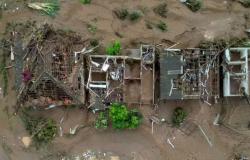
The government of Portugal declared that “no specific process or program of actions was and is not at stake” related to reparations to former colonies.
In a statement, the government states that “the relations between the Portuguese people and all the people of the States that were former colonies of Portugal are truly excellent, based on mutual respect and the sharing of common history.” The information was released by the Portuguese newspaper Público this Saturday (27).
Rebelo de Sousa’s speech – the first to admit historical reparation – was refuted by parliamentarians from the Democratic Alliance, the center-right coalition that governs Portugal. The leader of Chega, a far-right party, called the act betrayal.
This Saturday (27), Rebelo de Sousa returned to the subject and said that canceling debts, offering financing to former colonies and facilitating the mobility of citizens of these countries are forms of compensation.
“We cannot put this under the carpet or in a drawer. We have an obligation to pilot, to lead this process”, he stated. “But is reparation paying compensation? No, it is a reality that began 50 years ago (…) All our cooperation was, for 50 years, in addition to building the present and the future, a form of reparation. “
For the president, the reparation process is not necessarily limited to paying compensation to the countries involved. He claims that this is a reality that began 50 years ago, using as an example the forgiveness of debts to colonized countries, in addition to lines of credit, financing and other programs linked to former colonies.
There were more than four centuries of colonial era, when countries such as Brazil, Angola, Mozambique, Benin, Cape Verde, São Tomé and Príncipe, East Timor, as well as parts of India were under Portuguese rule.
In Portugal, the government and the presidency of the Republic are different institutions. The government is made up of parliamentarians and led by a prime minister. The President of the Republic is head of State and appoints the Prime Minister based on a recommendation from Parliament.
Therefore, the president’s power ends up being more symbolic and, in practice, it is the prime minister who governs the country. For any reparation measure to be effective, the proposal must pass through Parliament.
Inquiry against Banco do Brasil
The action relies on research by 14 historians from 11 universities who point out the institution’s relationship with the slavery market. Among the notes, the investigation talks about the presence of some of the biggest slave traffickers of the time in the list of founders and shareholders of Banco do Brasil.
Tags: Government Portugal denies existence reparation process crimes colonies World





